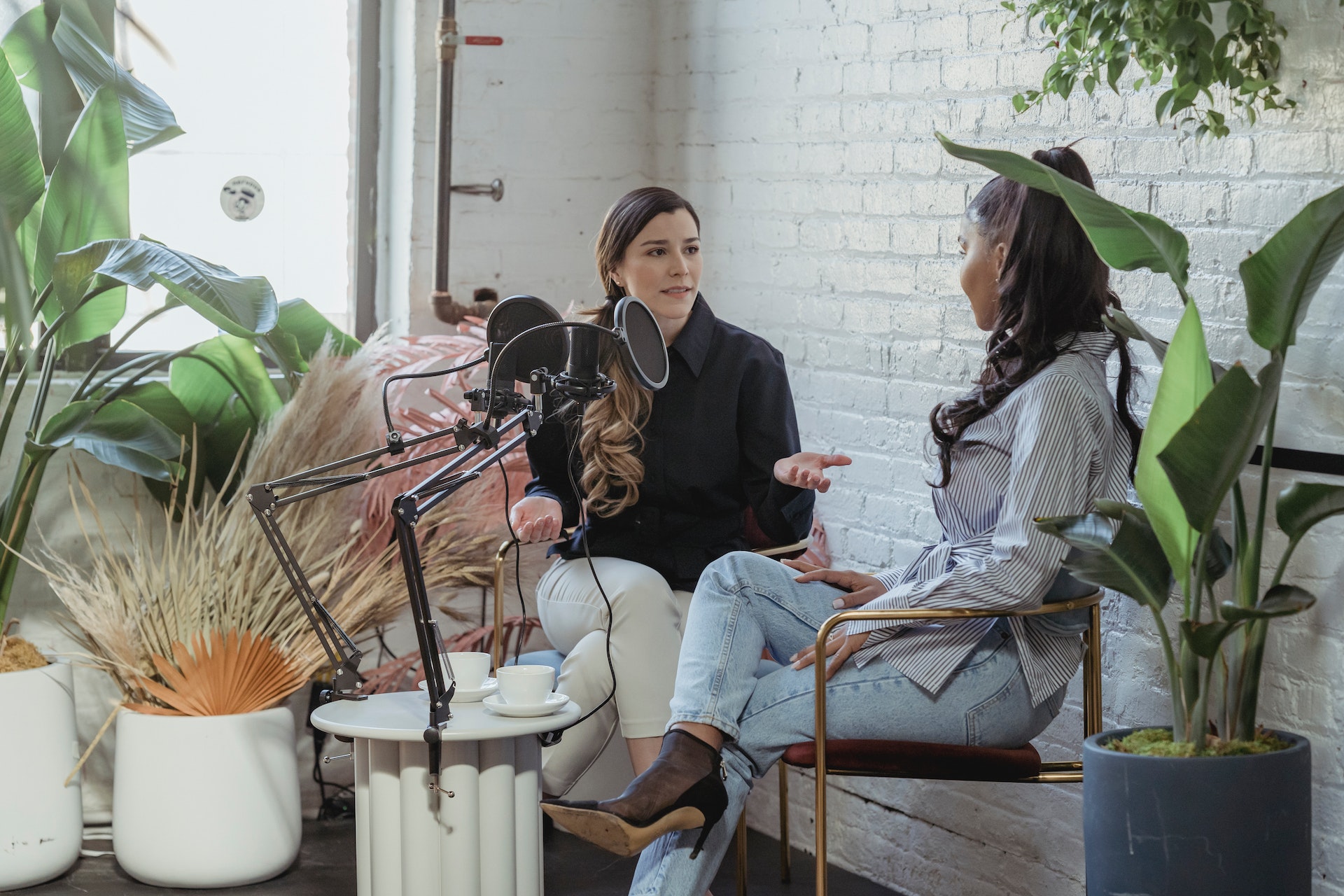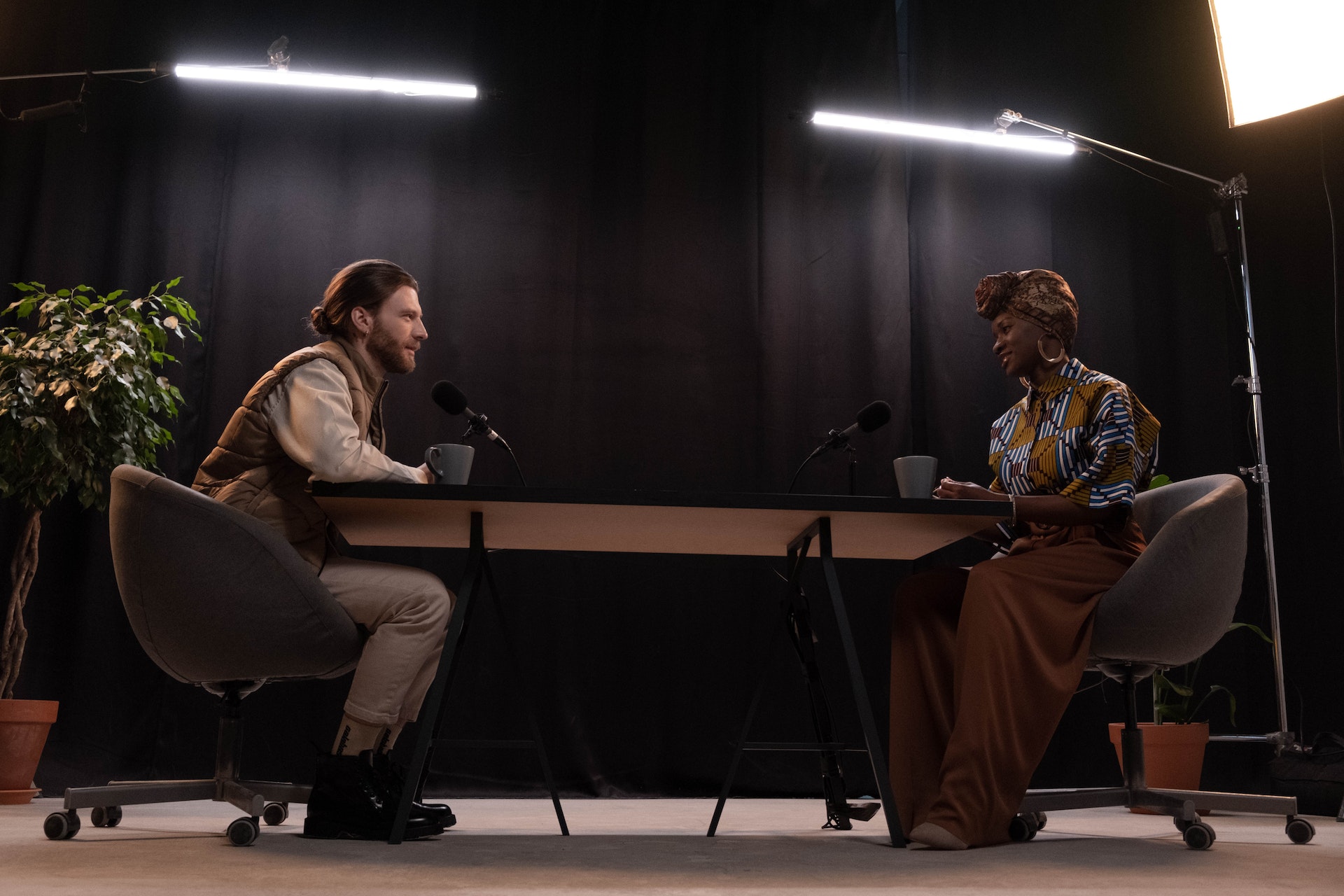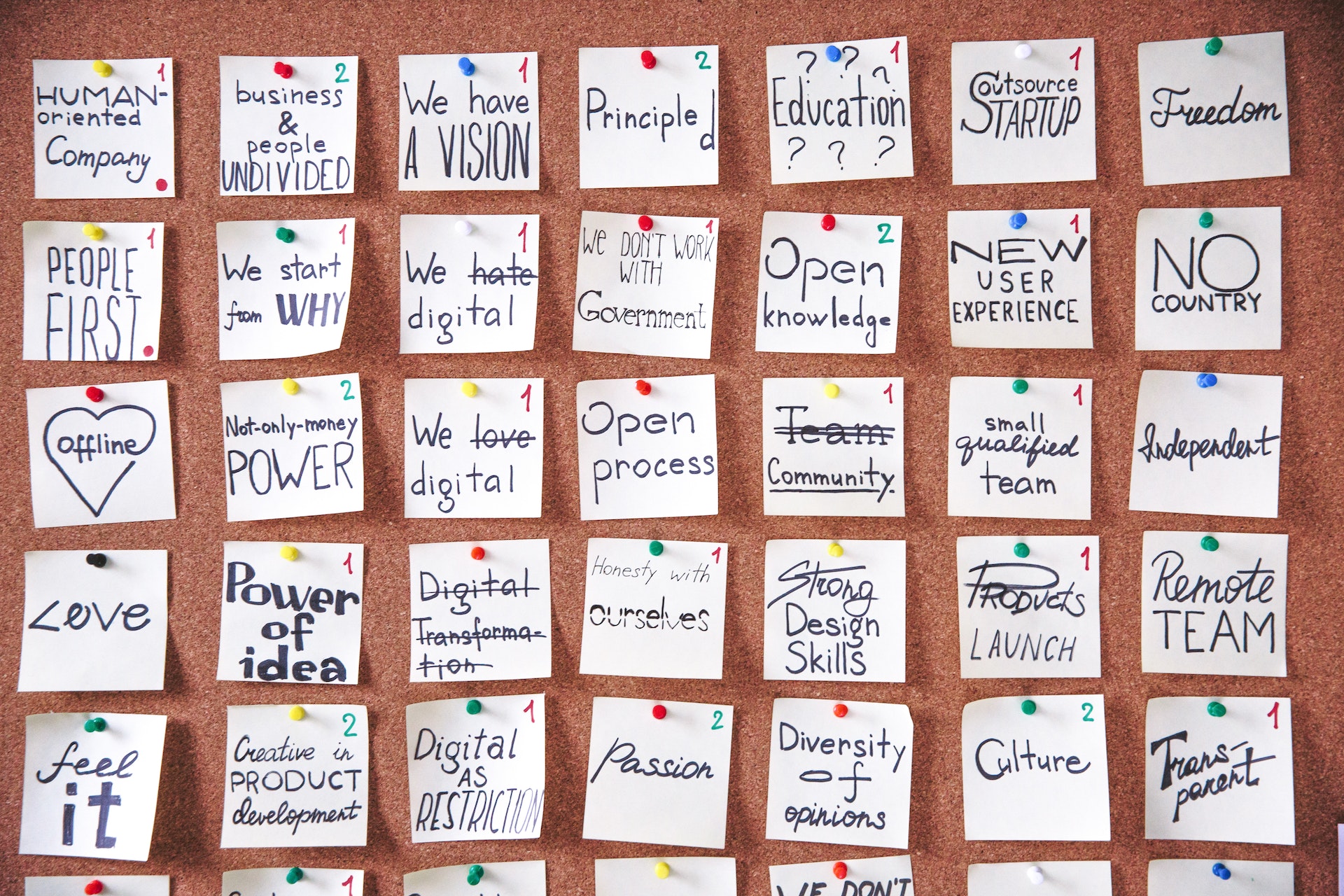September 26, 2023
Checklist for Starting a Podcast

Mike
No doubt you've heard of how engaging this podcast industry has become, with over 464.7 million listeners worldwide (22% of all internet users, by the way); it's never been a more exciting time to start your own.
That said, podcasting is also more competitive than ever. With over 5 million different shows out there (totaling 70 million episodes), you'll need to work hard to stand out and earn your spot as a growing, successful cast.
So, if you're thinking of starting out and you don't want to be a flash in the pan, you need to know what you're doing, and that's what today's guide is all about. This is your complete starting a podcast checklist - your guide to each step necessary for starting your own podcast, from understanding how podcasts work right up to generating revenue and becoming a sustainable podcast host.
Let's waste no more time and get straight into it!
Key Takeaways
Understand the podcast landscape and start a podcast to tap into the expanding market.
Craft an idea that adds value to your listener's lives, create engaging content, and build a strong brand.
Measure success by tracking metrics & evaluating performance for informed decisions & goal setting.
Understanding the Podcast Landscape

First, let's look at the podcasting landscape in a little more detail.
We have to be honest - the competition out there for podcasts is fierce. You're not only competing against other people who are just starting out with an idea, but you're also competing with creators and businesses with a lot of money to invest in their production and content - many of whom already have a large following to get them off the ground.
That's not to say it's impossible, far from it. There are plenty of opportunities to succeed and thrive with your own audience and community. So many people listen to podcasts daily, many of whom have it as part of their daily routine.
If they like what you have to offer, they'll stick around, so it's your job to make sure you're offering the best listener experience possible. Fortunately, there are plenty of ways to go about doing this.
Starting your own successful show requires having the right equipment and executing your plan as meticulously as possible. This can be achieved by forming a thorough checklist before releasing your first episode.
With every effort to make sure all bases are covered for you to stand out among other podcasters, listeners will have no issue immersing themselves in whatever content you decide to produce.
The Rise of Podcasts
As podcast listening continues to rise among the US population, it presents a huge opportunity for potential podcasters.
An effective opening episode is key in capturing and sustaining an audience. By delivering compelling material with excellent audio quality, you have the power to differentiate yourself from other podcasts available online.
The convenience of enjoying these broadcasts while on the go appeals significantly to many listeners – providing them with a unique experience compared to traditional media formats such as radio or television programs.
This increases your chances of connecting deeply with your target listener base right away since they can tune into episodes wherever and whenever suits their needs best!
Given this information, there have never been more favorable circumstances for newbies looking to create content that stands out amongst others: offering engaging stories accompanied by superior sound quality will ensure viewers remain devoted over time - starting off strong from Episode One's debut!
Why Start a Podcast Now?
Starting a podcast now could undoubtedly be your best decision.
After all, the world is digital, and podcasts are a big part of it. These days, people are obsessed with consuming information, but in new and innovative ways that it could be argued combine the classic charm of radio with the modern advancements of accessibility, convenience, and video.
Whether you're an established enterprise or an individual looking to expand your reach doesn't matter. Podcasting opens up intriguing opportunities to meet your audience where they are: walking their dogs, commuting to the office, cooking, or just lazing on a weekend afternoon.
It's a flexible, accessible, and innovative medium that provides an intimate connection uncommon to other forms of digital content.
Consider this—podcast listeners are incredibly loyal, often listening to an entire podcast episode at a time.
This dedication means you have a greater chance to establish a robust rapport with your audience, inspire engagements, and build a sense of community.
Podcasts also carry an aspect of exclusivity—listeners understand that they often get more in-depth information, nuanced discussions, and personal anecdotes from their favorite personalities.
By starting a podcast now, you are not just keeping pace with digital trends; you're harnessing the narrative power of your voice and creating a unique place in your audience's daily routine.
Indeed, in this era of information overload, a podcast can be your beacon of personalized communication.
And with that, let's begin the checklist for starting your own podcast.
Your Podcast Launch Checklist

Before looking at the checklist in a bit more detail, here's a breakdown of what the comprehensive podcast launch checklist looks like. Write it down. Copy it out. Make it your own. This is what you need to get started!
Podcast Launch Checklist
Define Your Podcast Concept: Get clear on your podcast's idea, mission, and purpose. Who is your target audience? What topics will you cover? How is it different from existing podcasts in your genre?
Name Your Podcast: Your podcast name should resonate with the content you're creating and be memorable for your audience.
Create Your Podcast Artwork: Design or commission a podcast logo or cover art related to your podcast theme.
Choose Your Podcast Format: Interviews, solo episodes, roundtable discussions, narrative stories, or a mix - choose a format that suits your content and style.
Plan Your Podcast Episodes: Thoughtfully decide on the topics for the initial episodes. This step also includes planning episode length and regularity.
Write and Record Your Podcast Intro and Outro: Create compelling introductions and conclusions for your podcast, including music and tagline.
Select Podcast Recording and Editing Software: Invest in quality recording and editing software to ensure your podcast has good sound quality.
Record and Edit Your First Few Episodes: Create a backlog of episodes before launch so you can release consistently.
Transcribe Your Episodes: This is beneficial for showing up in web search results or for listeners who can't listen to the episode but can read it.
Determine Your Podcast Hosting Platform: Based on features and cost, choose an appropriate platform to host your podcast episodes.
Submit Your Podcast to Podcasting Directories: Make your podcast accessible to as comprehensive an audience as possible by submitting it to platforms like Apple Podcasts, Spotify, Google Podcasts, etc.
Create a Promotional Plan: Use social media, email newsletters, or collaborations with other podcasters to promote your new audio podcast series.
Launch Your Podcast and Publish Regularly: Release your podcast and maintain a regular publishing schedule to keep your audience engaged.
Monitor Your Podcast Analytics: Keep track of how your podcast is doing. Use analytics data to understand how you can improve your content and reach.
Engage With Your Listeners: Interact with your audience through social media, email, or in-person events. This increases loyalty and can provide great ideas for future episodes.
Crafting Your Podcast Idea

Okay, let's start by building the foundations of your show, starting with your idea.
It's important to have a great concept that will appeal to its intended target audience.
This means taking the time to brainstorm ideas surrounding topics that tie in with your interests and knowledge so you can provide engaging content that offers something meaningful for listeners.
Choosing one specific subject gives the potential for an enthusiastic following. It provides an opportunity to become recognized on the matter by others. This would help set it apart from any other competitors while also giving creditability within this field.
Of course, you need to ensure your idea is popular and has some interest. Otherwise, you'll get no listeners, but it must also be unique. You can't simply copy what someone else is doing because it doesn't work. You can cover the same topics, sure, but you need to do it in a way that's best for you.
Identifying Your Podcast Niche
Similarly, podcasting success is typically determined by your chosen topic or field of interest.
Contemplate your interests, expertise, and that of your expected listeners when deciding on a niche.
When devoted to an area close to your heart, podcasting will be more enjoyable, and stimulating content for those tuning in will also be generated.
To come up with ideas, search for other relevant podcasts found on platforms such as Apple Podcasts or Spotify, which can help determine potential gaps in this particular market so that something exclusive can be provided through yours to its prospective audience.
Creating Engaging Content
After discovering your specialized audience, you ought to assemble material that interests and retains them. The key to successful podcast content is offering value regarding education, amusement, or motivation for listeners.
You could also use different styles and formats like interviews, single episodes, or roundtable discussions to satisfy all preferences within the target group.
When formulating episode concepts, consider what podcast topic would hold importance with this particular podcast's demographic to create topical content around those themes.
Having superior audio recordings, it's essential to stick by a regular publishing schedule, which not only aids in gaining followers but furnishes new episodes, aiding the expansion of impact and development in reach from said podcast.
Building Your Podcast Brand

Developing and preserving a strong brand is crucial for the success of your podcast.
Your branding includes everything from what you call your show and its graphics to the overall feeling conveyed by its contents. It's like Joe Rogan's spinning face podcast artwork at the beginning of every show. It's the style and theme of the studio. It's even in the way you talk, the way you interview and ask questions, and the way you interact with your audience.
By consistently creating an alluring identity, you can create a captivating experience that entices listeners and keeps them engaged with more content.
A distinct name connected to attractive artwork is essential in forming this image. Both should be unique yet relatable and relevant to how people view or interpret your broadcast materialistically and emotionally/thematically.
Choosing a Memorable Name
Coming up with a suitable podcast name is crucial to your show's success.
The title you choose should reflect the main topics of your content and enable potential listeners to understand what they can expect from it quickly.
Make sure that the chosen words are not already in use by another brand or associated with an existing podcast, trademark, etc.
An interesting name will give your podcast presence among competing shows and make it simpler to remember and share between people, significantly increasing its popularity amongst target audiences!
Designing Eye-Catching Podcast Artwork
When scrolling through podcast directories or social media, potential listeners will instantly be drawn to your show's artwork.
It's essential to create an attractive visual that accurately reflects the theme and mood that you want to be associated with your podcast.
Eye-catching podcast artwork can help promote visibility on major platforms like Apple Podcasts – this could mean greater reach for those listening in!
For optimal success, ensure each element of your featured podcast artwork ties back into your brand while sticking within specifications (e.g., 3000 x 3000 pixels saved as JPEG/PNG).
By creating a professional aesthetic alongside quality audio content, you'll captivate current followers and draw new members of target audiences towards your podcast.
Selecting and Setting Up Podcast Equipment
Investing in quality podcast tools and software is essential to creating professional episodes that hit the mark with your listeners.
Nobody's going to listen to a podcast broadcasting crackling audio, frustrating volume peaks, and a conversation that's just uncomfortable, on a quality level, to listen to. Take a moment to think about how long you'd stay on a podcast that's using a poor-quality microphone.
Even talking about the most exciting subject, would you stick around? Probably not, and neither will others. We're not saying you need to invest in the highest quality professional equipment possible, but it needs to be decent.
These pieces of equipment are paramount for producing great sound for your podcasts so they stand out from others.
Picking the right items - like microphones and editing programs – helps make sure you have a polished result that keeps your audience engaged and returning for more content.
Microphone Selection
Let's take a little dive into microphones while we're here.
When assembling podcasting equipment, picking the right microphone is a significant step.
Protecting your online identity is as important as creating engaging podcast content. Ensuring that your digital footprint remains secure could potentially save you from headaches. Similarly, when considering the name for your podcast domain or any associated online presence, understanding and implementing domain protection becomes vital. Such protection services prevent unauthorized access to your domain information and reduce the risk of identity theft, much like privacy measures help safeguard personal listener details within podcasts.
An ideal mic will accurately pick up and produce your voice or sound so that it comes out clearly with professional-level quality. If an inappropriate microphone is used, there could be issues such as excessive noise, muffled audio, or distortion, making listening less enjoyable.
Yes, microphones are even more important than your chosen camera if you're recording video.
To choose effectively between different microphones (e.g., condenser, dynamic, and lavalier models), consider factors like the room environment where the recording will take place, what you can afford financially, and desired sound output quality. Research various available options before selecting the one suitable for your needs and preferences best!
Recording and Editing Software
Selecting user-friendly recording and editing software is key to creating high-quality podcast episodes.
Make sure the program you choose has all of the features required for proper audio enhancement, background noise reduction, and mistake elimination from recordings. When making your decision, be aware of budget restrictions, personal technical ability levels, and desired functionalities.
Popular tools include Audacity, GarageBand, and Adobe Audition.
You must explore different options until you find one that properly suits all your needs while remaining financially within reach.
Planning and Structuring Your Episodes

Structuring podcast episodes effectively is critical to providing a pleasant listening experience for your audience. An uninterrupted and compelling episode can be achieved through deliberate organization of content.
And you need to be doing this from your first podcast episode since this is what people will tune into and judge your podcast on. Remember, first impressions count, and if someone stumbles upon a mess of a podcast, the chances are they won't be coming back.
That's not to say you'll be a professional from the word "Go." Just like when you're starting anything new in life, you'll be bad in some ways, but you'll get better through practice and experience.
Choosing the right format and type of your podcast show matters when it comes to structuring podcasts - such as interviews, solo performances, or roundtable discussions, which may appeal to different audiences while keeping them hooked on what you have to say.
Episode Formats and Styles
When crafting the structure and style of your podcast episodes, it is crucial to consider factors like your desired demographic audience, content focus, and individual preferences.
Each podcast format and style provides various listening experiences for different audiences, which helps keep content interesting.
For instance, podcasts can be diverse in nature, including:
Interviews with industry professionals or people who are experts on a specific topic;
Solo shows where you discuss topics yourself
Roundtable discussions allow for conversations among various participants, giving unique perspectives regarding the theme discussed at hand.
Outlining and Scripting
Having an episode outline and script is essential for maintaining good conversation flow when producing a podcast.
The outlined plan helps you structure your ideas, discuss topics thoroughly, and stay focused during recording sessions.
Lessening the possibility of off-topic rambling. With this preparation approach, editing will be easier, allowing for crafting professional episodes quickly.
Hosting and Distributing Your Podcast

Now, with one or several podcast episodes recorded, it's time to focus on a successful podcast launch, and this starts with choosing which of the different podcast hosting platforms you want to host.
When creating a podcast, picking an efficient hosting provider to store and share your episodes is vital for reaching the intended audience. It defines who will have access to your podcast, who will listen, and how accessible and shareable your content is.
The appropriate host will always provide all the essential services and support for your podcast's success.
By sending it off into directories such as Apple Podcasts, Spotify, or Google Podcasts, you can enlarge viewership by boosting its visibility amongst potential followers.
That way, one may acquire more listeners while eventually achieving better results with their podcast project overall.
Selecting a Podcast Hosting Service
Selecting a podcast hosting service is an essential decision for any podcaster, as it can influence your show's reach and success.
When making this choice, several factors should be considered, such as cost, features offered, user-friendliness, and customer support options.
The most popular podcast hosting service choices among podcast hosts include the likes of Anchor, Libsyn, Buzzsprout, and Podbean.
However, no matter which one you choose, make sure you have done enough research beforehand so that all of your needs fit within both the feature offerings and budget parameters of what each host offers.
Submitting Your Podcast to Directories
Getting your podcast onto popular directories is an essential factor in increasing its exposure and widening its reach to potential fans.
Podcast hosting platforms like Apple Podcasts, Spotify, and Google Podcasts make it easier for people to discover new content, which can help you gain more subscribers. You'll also want to sign up and post on your RSS feed.
To successfully submit your podcast to these podcast platforms, ensure that all information included, such as name, description, or artwork, is accurate.
Plus, abide by each directory's stipulated rules regarding your audio file format & size, etc..
Putting forth the effort when submitting podcasts will amplify their presence while allowing them to attract even more listenership than before!
Promoting and Growing Your Podcast

Podcasting can be successful if you can promote and expand your show. Various marketing plans and platforms should be employed to maximize visibility, draw listeners, and stretch out the podcast's reach.
Creating a virtual presence, utilizing collaborations, and partnering with other creators alongside harnessing social media channels all represent tactics that could help develop your audience base while boosting the success of your podcast overall.
Employ these strategies accordingly so that followership growth is achieved easily yet efficiently!
Building an Online Presence
Social media and other online profiles are important to help spread the word about your podcast and interact with fans. Having a strong digital presence can expand your reach, as well as gain helpful feedback from those listening in.
Creating accounts on platforms like Twitter, Instagram, or Facebook for your podcast will assist this process by providing news updates regularly regarding the show. Additionally, leveraging tools like VPN for PC can enhance your online activities by ensuring privacy and secure access to platforms, especially when managing your accounts or interacting with listeners.
This also allows having conversations with listeners while promoting related content relevant to what's being discussed on air!
Leveraging Partnerships and Collaborations
Collaborating with other podcasters, influencers, and industry experts is an effective strategy to reach more people and strengthen your podcast. Identify those who share similar interests or align with you philosophically as potential partners.
Together, you can create compelling content for a broader audience base, which leads to successful results. Collaborating also allows access to each others' audiences while providing valuable resources within this niche setting.
Monetizing Your Podcast

Generating income from your podcast offers the activity a thrilling and financially rewarding dimension. Investigating various monetization approaches, including sponsorships, advertising, and affiliate marketing, allows you to realize financial gains for doing something you genuinely enjoy.
Now, you don't want to jump in and start monetizing too early. If someone's listening to a new podcast for the first time and you're just talking about sponsorships and products you have for sale, people will think you're too salesy and will switch off.
You need to focus on providing value first and then aim to monetize once you have an engaged and loyal community that actually listens and respects what you're talking about. It's all about trust and reputation.
It's essential to figure out which money-making strategies align best with your objectives and values and those of listeners who follow your show.
Opting for mutually beneficial methods – both on your end and theirs, should help ensure success in earning revenue through podcasting while contributing to its continuing expansion.
Sponsorships and Advertising
To bring in revenue, one of the most beneficial ways for a podcast is securing sponsorships and advertising deals. Aligning your show with like-minded businesses can be highly successful.
As such, it's important to ensure you are selecting partners who fit your target niche and share similar values.
Doing so will result in content that resonates better with listeners, making for a more rewarding experience all around, leading to more tremendous success.
Affiliate Marketing and Product Sales
Revenue generation from podcasting can be achieved by discussing and recommending relevant products through affiliate marketing or selling your own goods.
To ensure success, it is important only to promote items that genuinely match the content of your show while providing value for listeners.
Backing up trustworthy merchandise allows you to gain trust with them as well as induce their assistance via sales in assisting your podcast's growth.
Measuring Podcast Success

Tracking metrics and evaluating performance are vital components for achieving success in podcasting. Pay attention to the number of downloads, subscriptions, and audience involvement - as these key performance indicators will offer you insight into how your podcast is doing while also showing where changes could be made.
Regularly analyzing progress enables refining content, marketing initiatives, and overall goals for a successful podcast experience.
Staying informed on user preferences ensures that adjustments can be continually implemented so improvements can transpire, leading to more prosperous results.
Tracking Metrics
Monitoring your podcast's key performance indicators (KPIs) to evaluate its success is very important. To this end, you should monitor metrics like total downloads, average episode downloads per show, and the number of subscribers.
Also, taking note of listener demographic information is necessary for making informed decisions about enhancing content and marketing plans and achieving overall podcasting objectives.
Aside from focusing on quantitative measures, it's also worth considering qualitative feedback, such as reviews or comments posted by listeners.
These can give a great deal of insight into how effective the material has been at engaging with them, plus what changes could help improve engagement.
Evaluating Performance
Regularly evaluating the performance of your podcast is essential to determine areas where you can make improvements and find success. Setting achievable goals can be tracked over time for measuring results is wise.
Analyzing different components, such as content quality, listener engagement, and marketing efforts, will help direct changes and refine your podcasting approach.
By assessing these data points consistently and making decisions based on them accordingly – rather than solely relying on intuition – it's possible to continually upgrade the experience provided by your podcast while keeping up its growth momentum.
Summary
Creating a successful podcast that appeals to your target audience is an exciting endeavor. Put together the necessary planning, content production, and quality equipment, then promote it well - you're on track for success!
The key components are consistently delivering high-quality material with genuine engagement from listeners.
Take the first step today and explore where this journey will lead you.
Frequently Asked Questions
What is required to start a podcast?
Beginning a podcast requires you to pick out both the theme and arrangement, design an identity, acquire audio recording devices and ede, and prepare and document episodes before eventually uploading your product onto a hosting service for entry into the list of podcasts.
How much money does it take to start a podcast?
For those just starting out with podcasting, the costs are manageable - about $250 to $300 for quality equipment and a low-cost hosting solution from Castro or Audacity.
For businesses taking their podcasts more seriously, investment could range anywhere between 500 – 5,000 dollars, depending on the production value and scale of the venture.
Do podcasts make money?
Yes, podcasts can make money - typically up to $900 per episode with 10,000 downloads. Podcasters use a combination of strategies like sponsorships, affiliate marketing, and paid memberships to monetize their content.
How do I structure my first podcast?
To structure your first podcast, research your episode's topic and write a script with questions. Set up your equipment, choose recording software, practice good techniques, and hit record.
Introduce your episode and include primary themes, an intro, an outro, and segments for podcast music or ads. Visualize the topics and add talking points, imagery, or video for a more engaging episode.
Finally, call-to-action and cliffhanger elements can be used to engage the audience.
How do I choose the right podcast name and artwork?
Pick a descriptive and relevant title plus artwork that reflects your podcast's theme and its intended audience.
Ensure the name and podcast description can be distinguished easily, as well as make sure the visuals correspond to what tone you're going for with your show.

Tella — the screen recorder that edits videos for you.



